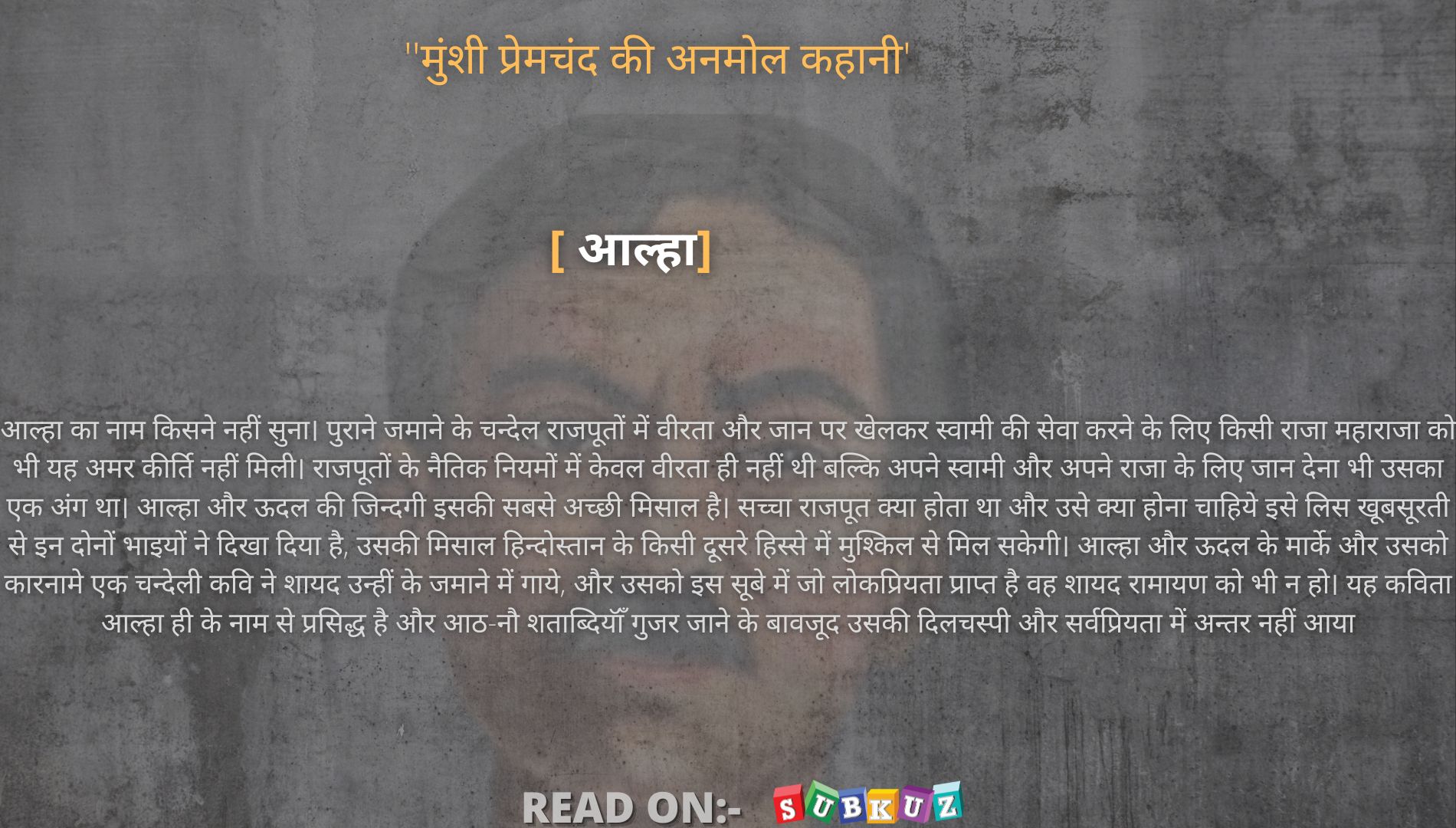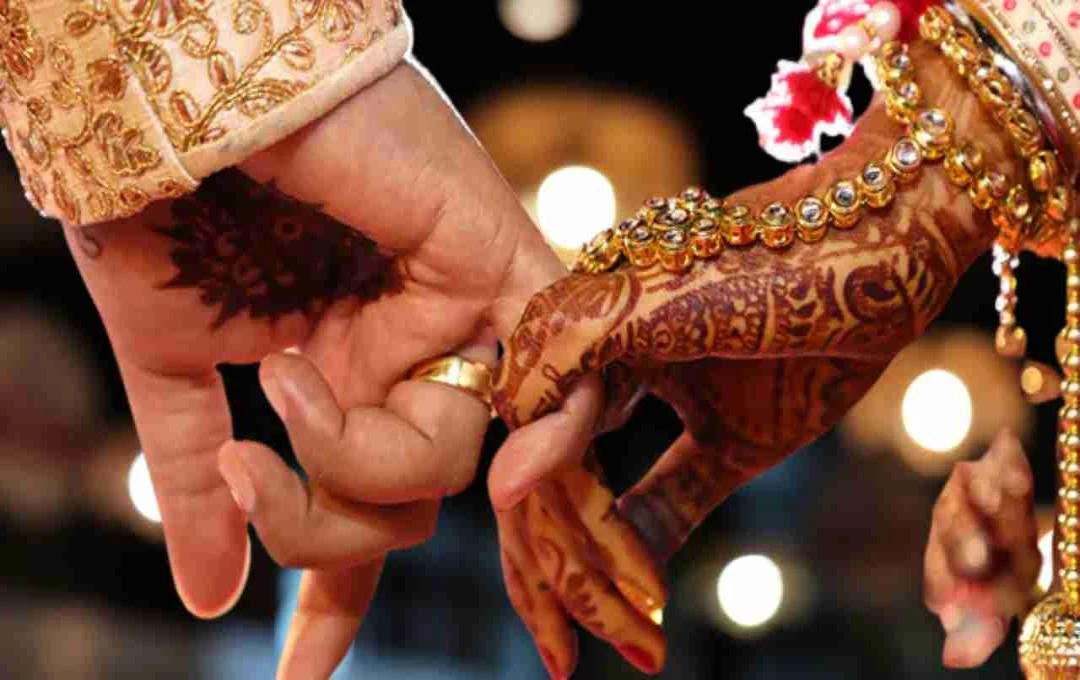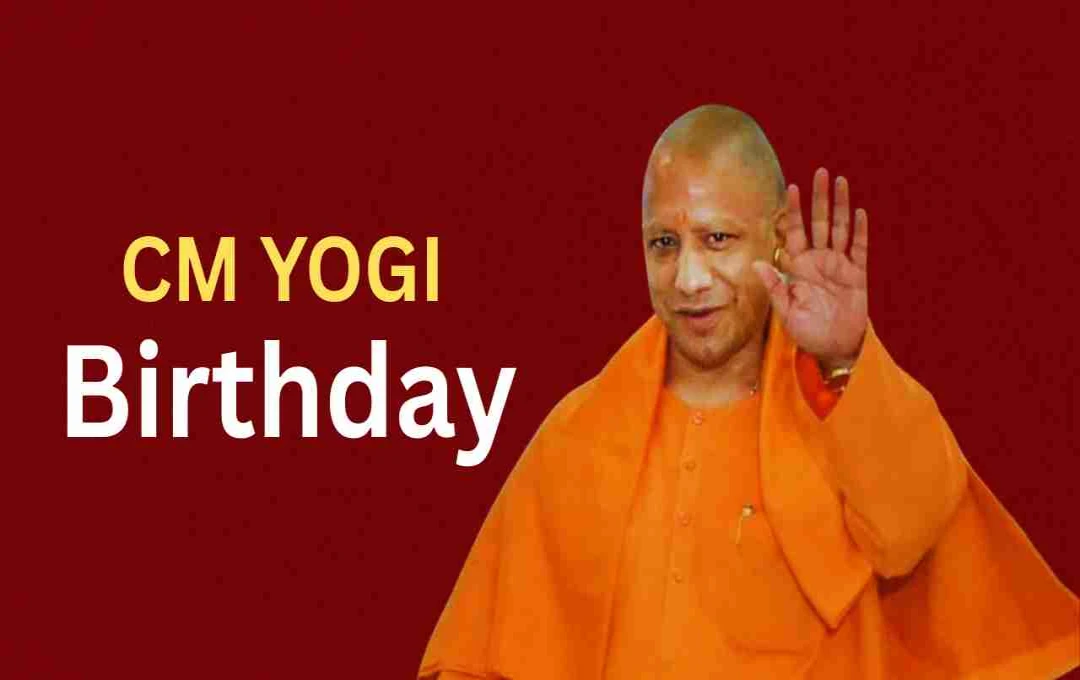Friends, our country has for centuries been the birthplace and land of great personalities brimming with virtues – sages, poets, writers, musicians, and many more. Thousands of works created by these eminent individuals are invaluable. Today's youth, in this digital age, seem to be losing touch, drifting further away from our heritage and precious treasure trove. subkuz.com consistently strives to bring you these invaluable treasures, along with entertaining stories, news, and information from India and around the world. Presented here is one such priceless and inspiring story by Munshi Premchand.
Alha
Who hasn't heard the name Alha? Even among the Chandela Rajputs of the old days, no king or emperor achieved such immortal fame for valor and risking one's life in the service of their lord. Rajput ethics encompassed not just bravery but also the sacrifice of one's life for one's king and master. The lives of Alha and Udal exemplify this perfectly. These two brothers beautifully illustrated what a true Rajput was and should be; an example rarely found elsewhere in India. The ballads of Alha and Udal, perhaps composed by a Chandela poet during their own time, enjoy a popularity in this region that perhaps even the Ramayana doesn't match. This poetry, known as the Alha ballad, retains its appeal and popularity even after eight or nine centuries.
Singing the Alha ballad is a significant custom in this region. In villages, thousands gather to listen. Even in cities, these gatherings occasionally appear. This story is more popular among the common people than the elite. Attend any gathering; thousands of people sit on the ground, the entire audience seemingly entranced, as the Alha singer, seated on a raised platform, recites their ballad. Their voice rises and falls as needed, but when they begin to describe a battle and its preparations, the flow of words, their gestures and expressions, the rhythmic beat of the dhol, and the skillful weaving of heroic words—a unique feature of war ballads—all combine to ignite a heroic fervor in the hearts of the listeners. The style of narration is simple, engaging, and easily understood. The simplicity of description and emotion is the lifeblood of artistic beauty.
Raja Paramaladeva was the last king of the Chandela dynasty. This dynasty ended at the beginning of the 13th century. Mahoba, a small town today, was then the Chandela capital. Mahoba's kingdom bordered Delhi and Kannauj. Alha and Udal were esteemed members of Raja Paramaladeva's court. These two brothers were still children when their father, Jasraj, was killed in battle. The king, moved by their orphanhood, brought them to the royal palace and entrusted them to the care of his queen, Maliniha. The queen raised and nurtured them like her own son. As young men, these two brothers became famous throughout the world for their bravery. Their valor brought glory to Mahoba.
Great warriors of Mahoba,
Whose strength none could overcome.
Alha and Udal were always ready to sacrifice their lives for Raja Paramaladeva. Queen Maliniha raised them, arranged their marriages, and cared for them. This bond of loyalty and gratitude made the brothers staunch protectors of the Chandela king and devoted servants to Raja Paramaladeva. Due to their bravery, hundreds of proud kings in the surrounding areas became subservient to the Chandelas. The boundaries of the Mahoba kingdom expanded like a river flood, and the Chandelas' power grew from a waxing moon to a full moon. These two warriors were never at rest. They yearned to display their prowess on the battlefield. They found no sleep on comfortable beds, and the times were equally restless. In those days, peace was equivalent to oblivion. Swords clashed, and rivers of blood flowed at the slightest provocation. Even weddings resembled bloody battles, the birth of a daughter signifying impending doom. Thousands of soldiers, chiefs, and relatives were sacrificed as dowry.
Alha and Udal are a true reflection of that tumultuous era, and though they were not immune to the moral weaknesses and inequalities of their time, their flaws were not their fault, but a product of their era.
Alha's maternal uncle, Mahil, was a man with a dark heart, harboring resentment. The brothers' prestige and power were thorns in his side. His life's greatest desire was to bring their greatness to ruin. He dedicated his life to this nefarious goal. He plotted endlessly, instigating countless conflicts and even setting fires, until finally, his insidious machinations intoxicated Raja Paramal.
One day, Raja Paramal was sitting alone in court when Mahil arrived. Noticing Mahil's downcast demeanor, the king asked, "Brother, why do you look so troubled?" Tears welled up in Mahil's eyes. The control that a deceitful man has over his emotions is something even a great yogi would find difficult. His heart weeps, but his lips smile; his heart enjoys pleasures, but his eyes cry; his heart burns with envy, yet honey and sugar flow from his tongue.
Mahil said, "Your Majesty, living under your shadow, I desire nothing more in this world. But the ingratitude and disruptive behavior of those whom you raised from dust to the heavens, those who have become powerful through your grace, cause me great sorrow."
Paramal asked in surprise, "Are there such people among those who have eaten my salt?"
Mahil, "Your Majesty, I cannot say anything. Your heart is an ocean of kindness, but a ferocious crocodile has entered it."
"Who is it?"
"Me."
Raja Paramal exclaimed in astonishment, "You!"
Mahil, "Yes, Your Majesty, I am that unfortunate person. I have come before you today to plead my case. My duty towards my relatives pales in comparison to my devotion to you. Alha is my heart's dearest. His flesh is my flesh, and his blood is my blood. But one must consult a physician when a disease takes root in the body. Alha is intoxicated by his wealth. He has developed the false notion that this kingdom exists solely due to my strength."
Raja Paramal's eyes reddened. He said, "I have always considered Alha my son."
Mahil, "More than a son."
Paramal, "He was an orphan, without a protector. I raised him, nurtured him, granted him estates, and made him the commander of my army. I sacrificed twenty thousand Chandela warriors at his wedding. His mother and my Maliniha have slept in each other's arms for years. Can Alha forget my kindness? Mahil, I don't believe you."
Mahil's face turned pale. But composing himself, he said, "Your Majesty, my words have never been false."
Paramal, "How can I trust you?"
Mahil quietly whispered something into the king's ear.
Alha and Udal were practicing Chaugan, a game similar to polo. Thousands of people were watching this spectacle in a large field. The ball, like an unfortunate soul, bounced erratically. A watchman arrived and said, "The Maharaja summons you."
Alha felt suspicious. Why did the Maharaja summon him at this unusual hour? The game stopped. The ball was given a break from the blows. He immediately went to the court with the watchman, bowed, and offered his respects.
Paramal said, "I ask something of you. Will you give it?"
Alha simply replied, "Command me."
Paramal, "You won't refuse?"
Alha looked at Mahil, suspecting something amiss. Why this smile on his face? Why these flowers on the Gulmohar tree? Is my loyalty being tested? He said passionately, "Your Majesty, I am not accustomed to hearing such questions from you. You are my protector, my provider, my king. At your command, I can leap into fire and fight death. I can achieve the impossible with your command. Do not ask me such questions."
Paramal, "Well done, that is what I expected."
Alha, "What is your command?"
Paramal, "You have the Nahr horse?"
Alha, saying "Yes," glared at Mahil with furious eyes.
Paramal, "If you don't mind, lend it to me for my use."
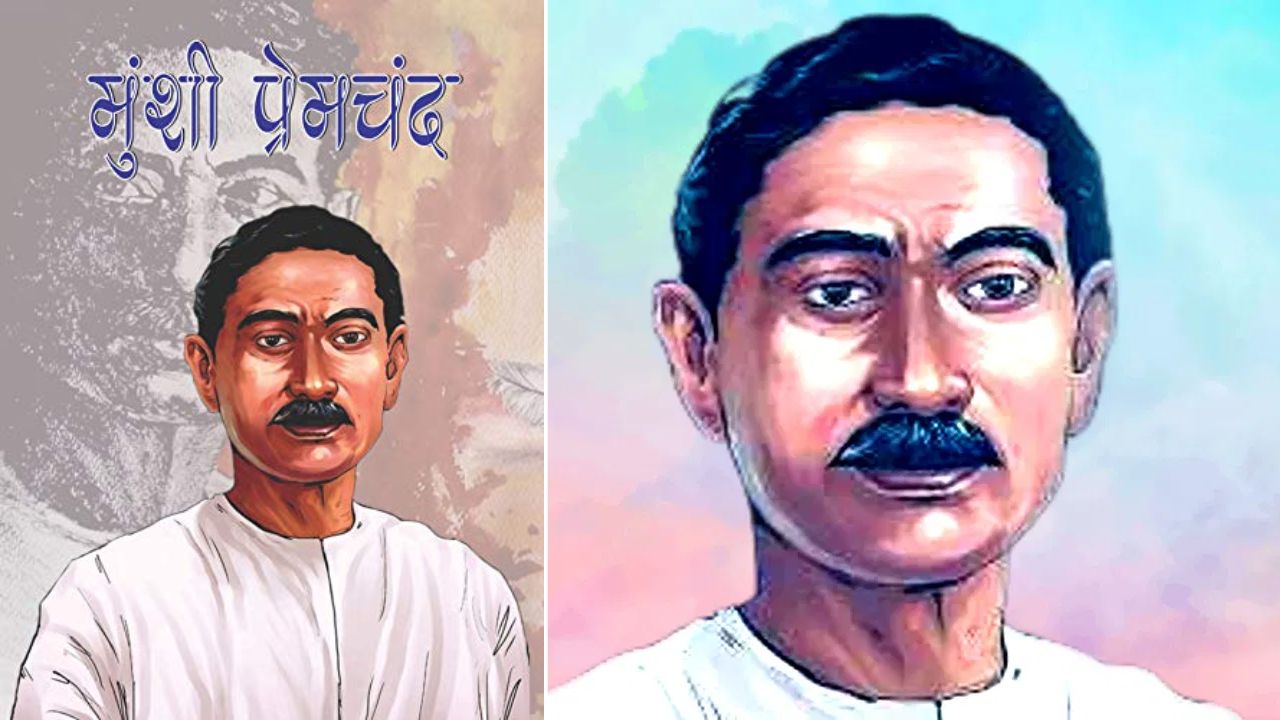
Alha could not answer, thinking, "I have promised not to refuse. I have lost. I shouldn't refuse. Surely, my loyalty is being tested. My refusal is untimely and dangerous. That's not the problem. But how can I refuse without being called disloyal? My relationship with the king is not merely that of master and servant; I have played in his lap. When my hands were weak and my legs could not stand, he endured my troubles. Can I refuse?"
His thoughts shifted: "Granted, the king's kindness is countless; every hair on my body is burdened by his favors. But a Kshatriya never gives his mount to another. This is not the dharma of Kshatriyas. I am raised and indebted to the king. I have control over my body; I can offer it to the king. But I have no control over Rajput dharma; I cannot break it. Those who have considered the fragile threads of dharma as walls of iron have made the name of Rajputs shine. Shall I forever stain myself? Ah! Mahil has trapped me. Before me is a ferocious tiger; behind, a deep ravine. Either I suffer humiliation or I am called ungrateful. Either I sink the Rajput name or I am ruined. Well, whatever God wills. I accept being called ungrateful, but not humiliation. I accept ruin, but not tarnishing Rajput dharma."
Alha bowed his head, lost in these thoughts. This was a trial for him; his future depended on success.
But for Mahil, this was a less demanding test of his patience.
The day arrived that he had eagerly awaited. This flood of joy was now eroding the iron wall of restraint. The victory of the weak mortal over the accomplished yogi was unfolding. Suddenly, Paramal asked Alha in a loud voice, "What hesitation is this? Don't you want to give it?"
Alha looked the king in the eye and said, "No."
Paramal was enraged. He snapped, "Why?"
Alha replied with unwavering resolve, "This is not the dharma of Rajputs."
Paramal, "Is this the return for my kindness? You know what you were before and what you are now."
Alha, "Yes, I know."
Paramal, "I made you, and I can unmake you."
Alha could no longer contain himself; his eyes reddened, and his brows furrowed. In a sharp tone, he said, "Your Majesty, I will always be grateful for your kindness. A Kshatriya never forgets kindness. But you have shown me kindness, and I have served you with devotion. Merely the sense of duty and gratitude cannot produce the devotion I have repeatedly demonstrated. But now I am convinced that I have no future in this court. Accept my final salute, and forgive any mistakes I have made through ignorance."
Looking towards Mahil, he said, "Uncle, from today, the bond of blood between us is broken. If you thirst for my blood, I am also your enemy."
Alha's mother's name was Deval Devi. She is counted among those spirited, high-minded women who have made India's past so captivating. Even in that dark age, when a terrible flood of internal strife and hatred had engulfed the country, India produced such women who could illuminate even the darkest pages of history. Hearing from Deval Devi what Alha did to preserve his honor filled her eyes with tears. She embraced both her sons and said, "Son, you did what was the dharma of Rajputs. I am fortunate to have sons who uphold honor."
That day, both brothers left Mahoba, taking nothing but their swords and horses. They left all their belongings behind. A soldier's wealth and honor are his sword. He who possesses valor needs no other wealth.
It was the rainy season; rivers and streams were overflowing. The earth, abundantly blessed by Indra's generosity, could scarcely contain itself. The melodious calls of peacocks echoed through the trees, and carefree farmers, intoxicated by the serenity of the fields, sang the Malhar ragas. Lush greenery on the hills, water mirroring the surface, and the natural adornment of wild creepers and plants brought a youthful exuberance to nature. The cool, gentle breeze of the plains, the sweet and delightful fragrance of wildflowers, and the waving, colorful crops in the fields created a storm of desires in their hearts. In this auspicious season, Alha bid a final farewell to Mahoba. Both brothers' eyes were red with tears, for they were leaving their homeland. In these very streets, they had learned to walk, sailed paper boats in these ponds, and enjoyed the carefree pleasures of youth.
They were now parting from it forever. Both brothers moved forward, but very slowly. The thought lingered that perhaps Paramal had sent a trusted man to appease the offended. They held their horses tight, but when the last trace of Mahoba's hills disappeared from their sight, the last glimmer of hope also vanished. They, who had no country, took a deep breath and urged their horses on. News of their exile spread rapidly. There was a place for them in every court; messages arrived from kings on all sides. Jayachandra, the king of Kannauj, sent his prince to meet them. What the messages could not accomplish, this meeting did. The prince's hospitality and welcome drew the two brothers to Kannauj.
After Alha and Udal left, various troubles began in Mahoba. Paramal was a weak ruler. Subordinate kings raised the banner of rebellion. There was no power left to subdue these contentious people. Some of Prithviraj's army from Delhi, victorious after a battle, was returning. They camped in Mahoba. It doesn't take long for swords to clash among hardened soldiers. Whether due to the excesses of Raja Paramal's courtiers or the Chauhan soldiers, a conflict arose between the Chandelas and the Chauhans. A battle ensued. The Chauhans were fewer in number. The Chandelas, disregarding the rules of hospitality, quenched their thirst for blood with that of the Chauhans, without realizing that the plight of a handful of soldiers would bring calamity upon the entire country. Innocent blood would stain their hands.
When Prithviraj received this heartbreaking news, his anger knew no bounds. He swept down on Mahoba like a storm and, after devastating Sironj, a famous town of Mahoba, advanced towards Mahoba. The Chandelas also mustered their army. But in the first encounter, their morale collapsed. Without Alha and Udal, their army was like a wedding procession without a groom. The entire army scattered. Panic spread throughout the land. The fear of Prithviraj's imminent arrival in Mahoba paralyzed the people. Paramal deeply regretted his actions, but now regret was futile. Seeing no other option, he requested a one-month truce from Prithviraj. The Chauhan king never let go of the rules of war. His valor did not permit him to attack a weak, unsuspecting, or unprepared enemy. If he hadn't adhered to these rules so strictly in this instance, he wouldn't have faced such a fate at the hands of Shahabuddin. His bravery became the cause of his demise. He accepted Paramal's message, and the Chandelas breathed a sigh of relief.
Now consultations began on how to confront Prithviraj. Queen Maliniha also participated in these deliberations. Some suggested building a high wall around Mahoba; others said they should abandon Mahoba and move south. Paramal remained silent, seeing no option but surrender. Then, Queen Maliniha stood up and said:
"Chandela Rajputs, what childish talk is this? Will you stop the enemy by building a wall? A whirlwind is never stopped by a broom! You advise abandoning Mahoba and fleeing. Such cowardly advice is given by women. Where has all your bravery and self-sacrifice gone? Not long ago, kings trembled at the name of the Chandelas. The Chandelas' reputation was high; you won hundreds of battles in a few years, never suffering defeat. Your swords never lost their luster. You are still the same, but you lack that valor. That valor left Mahoba with the Banafal dynasty. Deval Devi's anger has angered Chandika Devi. If anyone can salvage this lost game, it is Alha. Only those two brothers can save you in this precarious moment. Appease them, reason with them. Mahoba has great claims on them. They were raised on the soil and water of Mahoba. They cannot forget Mahoba's rights. God has given them strength and knowledge; they alone can take up the banner of victory."
Queen Maliniha's words resonated in the hearts of the people.
Jagna Bhat set out to bring Alha and Udal from Kannauj. These two brothers were going hunting with Prince Lakhan when Jagna arrived and offered his respects. His face was etched with worry and hesitation. Alha anxiously asked, "Poet, how did you find us here? Is everything alright in Mahoba? Why have you remembered us poor souls?"
Tears welled up in Jagna's eyes. He said, "If all were well, why would I come seeking your refuge? Gods are remembered only in times of trouble. Indra's wrath has fallen upon Mahoba. Prithviraj Chauhan has besieged Mahoba. Narsingh and Virsingh have fallen in battle. Sironj is reduced to ashes. The Chandela kingdom is on the verge of collapse. There is utter chaos throughout the land. A one-month respite has been obtained with great difficulty, and Raja Paramal has sent me to you. In this time of crisis, we have no helper; no one to bolster our courage. Since you left Mahoba… no one remains to strengthen our resolve."
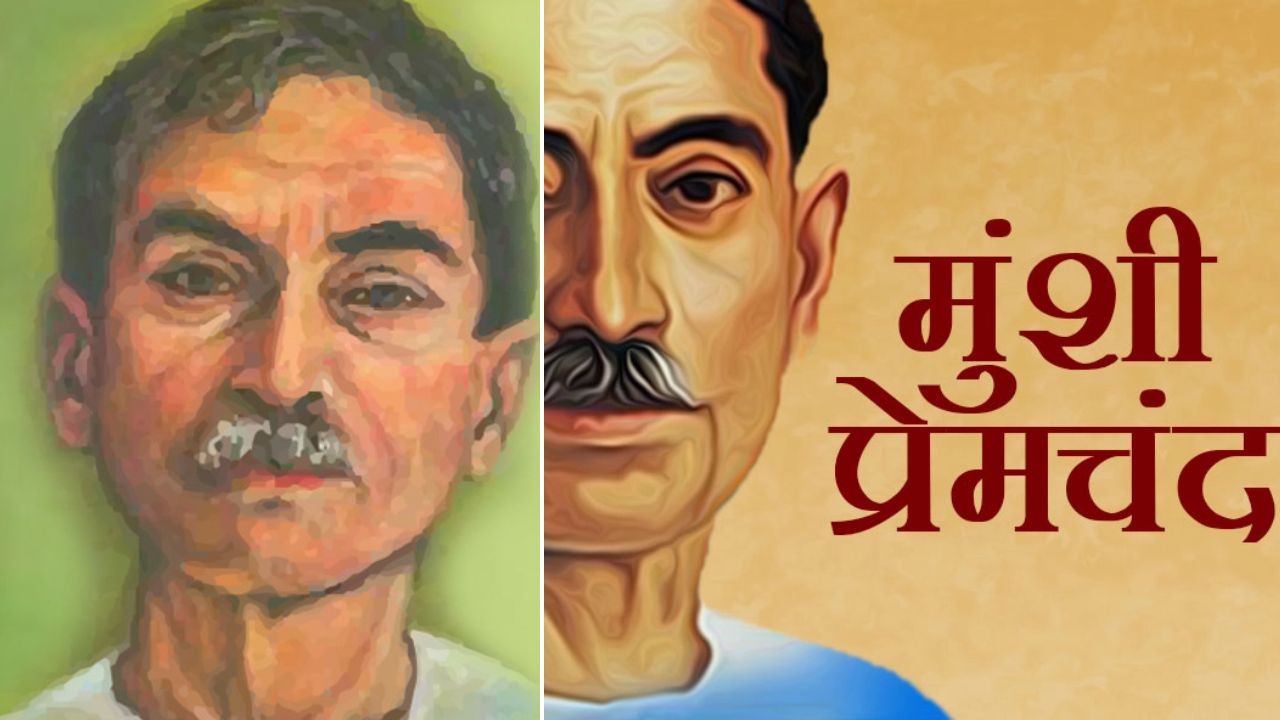
Since you severed ties with Mahoba, Raja Paramal has not smiled. Paramal, whose sadness worried you, has not slept for months. Queen Maliniha, in whose lap you played, weeps day and night in your memory. From her window, she gazes towards Kannauj, awaiting your return. O sons of the Banafal dynasty! The Chandela boat is sinking. The Chandela name is about to be erased. Now is the time for you to take up your swords. If you fail to save the sinking boat at this juncture, you will forever regret it, because your name and that of your illustrious father will also sink with it.
Alha replied coldly, "We no longer care. Our name and our father's name sank the day we were unjustly expelled from Mahoba. Let Mahoba sink or remain; our hearts are full; we no longer desire to see it. Kannauj is now our homeland. What was the reward for our service? Our father sacrificed his life for Mahoba, we defeated the Gods and made the Chandelas masters of Devgarh. We fought the Yadavas and planted the Chandela flag on the field of Kathiyar. With my own hands, I stemmed the rising tide of Kachwahas. I conquered the field of Gaya and broke the pride of Riwa. I myself collected tribute from Mewat. We did all this, and this is our reward? My father subjugated ten kings. In Paramal's service, I received seven life-threatening wounds, escaping death thrice. I fought forty battles and never lost. Udal won seven bloody battles. We raised the banner of Chandela bravery. We raised the Chandela name to the heavens and received this as our reward? Why doesn't Paramal now call upon that same treacherous Mahil, to whose satisfaction I was exiled, for help?!"
Jagna replied, "Alha! These are not the words of Rajputs. The kingdom for which your father sacrificed his life is now being trampled underfoot by the enemy. Being your father's sons, does your blood not boil? The Rajput who abandons his king in distress has no place but hellfire. Destruction looms over your motherland. Your mother and sisters are targets of the lustful eyes of the enemy; does your blood still not boil? Can you sleep peacefully in Kannauj while witnessing the plight of your country?"
Deval Devi heard news of Jagna's arrival. She immediately summoned Alha and said, "Son, forget past grievances and prepare to leave for Mahoba today."
Alha could not answer, but Udal angrily retorted, "We cannot go back to Mahoba. Have you forgotten the day we were thrown out of Mahoba like dogs? Let Mahoba sink or remain; our hearts are full; we no longer wish to see it. Kannauj is now our homeland."
The Rajput woman could not bear such sinful words from her son. In anger, she said, "Udal, are you not ashamed to utter such words? I wish God had kept me barren so that I wouldn't have become the mother of such sons. Was it for such ingrates, who bring disgrace upon the Banafal name, that I endured the pain of childbirth? Worthless ones, get away from my sight. Do not show your face to me. You are not Jasraj's sons. He who fathered you cannot be Jasraj."
This was a heart-wrenching blow. Shame caused sweat to break on the brothers' foreheads. Both stood up and said, "Mother, stop. We cannot bear to hear more. We will go to Mahoba today and sacrifice our blood in the service of Raja Paramal. We will glorify our father's name with the gleam of our swords on the battlefield. We will display our valor against the Chauhans and immortalize the name of Deval Devi's sons."
Both brothers left Kannauj, with Deval Devi accompanying them. When they, the offended ones, reached their motherland, water fell on dry crops; broken spirits were revived. A lakh of Chandelas stood to welcome these heroes. After many days, they met these two brothers, separated from their homeland. Eyes shed tears of joy. Raja Paramal, upon hearing of their arrival, came on foot to Kirat Sagar. Alha and Udal rushed and clung to his feet. Tears flowed from the eyes of all three, and all grievances were washed away.
The enemy stood at the gate; there was no time for extended hospitality. On the banks of Kirat Sagar, Alha was appointed commander-in-chief by the counsel of the nation's leaders and courtiers. Oaths to fight to the death were exchanged there. The brave warriors vowed to retreat only in death. People embraced each other and set out to decide their fate. No one had a trace of sadness in their eyes or on their faces that day; women laughed as they bid farewell to their loved ones; men laughed as they separated from their wives, for this was the final battle; victory meant life, and defeat meant death.
Near the place where no town now stands, the two armies clashed, and for eighteen days, the market of death and destruction remained heated. A fierce battle ensued. Prithviraj himself participated in the battle. Both sides fought fiercely. Warriors poured out their hearts, and the armies on both sides perished. Out of three lakh men, only three survived – one Prithviraj, the second Chanda Bhat, and the third Alha. Such a terrible, relentless, and decisive battle was perhaps never fought in any country or era. Both lost and both won. Chandelas and Chauhans were forever mingled with the earth, for the decision of the battle of Thanesar was also made on this battlefield. All the experienced soldiers among the Chauhans were used in that war. When the confrontation with Shahabuddin occurred, inexperienced soldiers were brought to the battlefield, and the result was what it could be. Alha's whereabouts remained unknown; he either drowned in shame or became an ascetic.
The common belief is that he is still alive. People say that he became immortal. This is quite right, for Alha truly is immortal; he cannot be erased; his name will forever endure.
This was an inspiring story by the great writer Munshi Premchand. This story teaches us many new things. The entire subkuz team strives to bring our visitors inspiring stories every day. Keep reading such inspiring and enlightening stories on subkuz.com.
